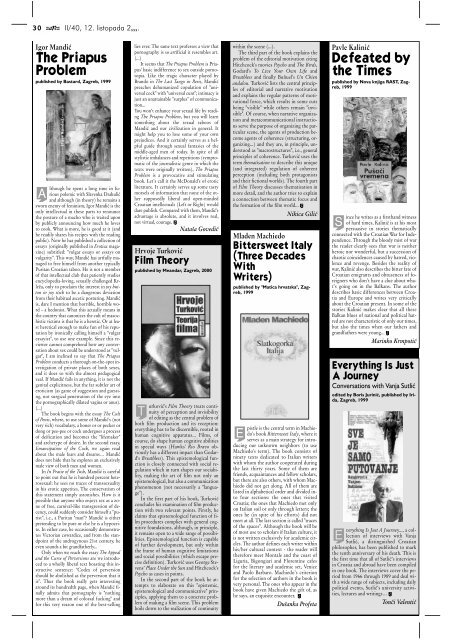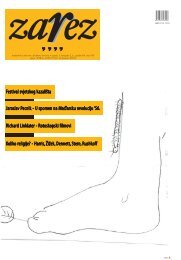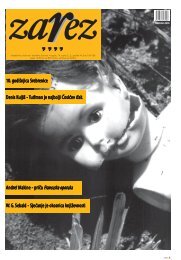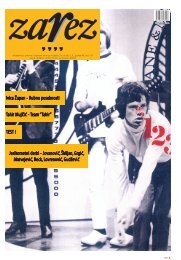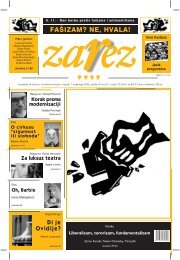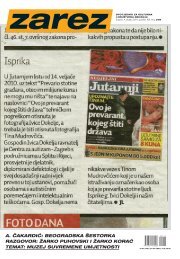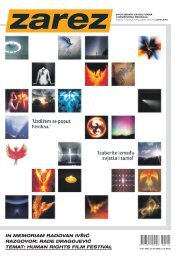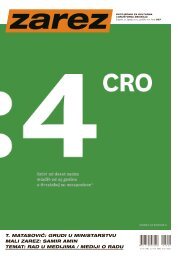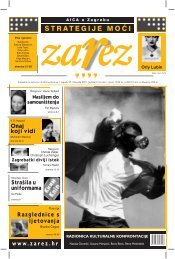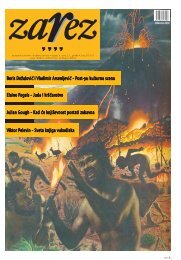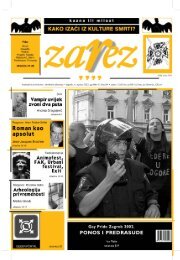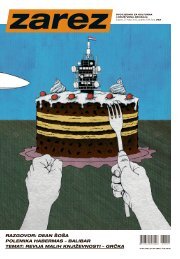30 II/40, 12. listopada 2,,,.Igor MandiæThe PriapusProblempublished by Bastard, Zagreb, 1999lthough he spent a long time in furiouspolemic with Slavenka Drakuliæand although (in theory) he remains asworn enemy of feminism, Igor Mandiæ is theonly intellectual in these parts to renouncethe posture of a macho who is waited uponby publicly announcing how much he lovesto cook. What is more, he is good at it (andhe readily shares his recipes with the readingpublic). Now he has published a collection ofessays (originally published in Erotica magazine)subtitled: "vulgar essays or essays onvulgarity". This way, Mandiæ has artfully managedto free himself from another typicallyPuritan <strong>Croatian</strong> taboo. He is not a memberof that intellectual club that patiently studiesencyclopedia-loving, sexually challenged Krlea,only to proclaim the interest in joy buttonor joy stick to be a dangerous deviationfrom their habitual ascetic posturing. Mandiæis, dare I mention that horrible, horrible word– a hedonist. What this actually means inthe country that canonizes the cult of masochisticvictims is that he is a heretic. Or at leastheretical enough to make fun of his reputationby ironically calling himself a "vulgaressayist", to use one example. Since this reviewercannot comprehend how any conversationabout sex could be understood as "vulgar",I am inclined to say that The PriapusProblem conducts a thorough on-the-spot investigationof private places of both sexes,and it does so with the almost pedagogicalzeal. If Mandiæ fails in anything, it is not thegenital explicitness, but the far subtler art oferoticism (as game of suggestion and guessing,not surgical penetration of the eye intothe pornographically dilated vagina or anus).(...)The book begins with the essay The Cultof Penis, where, to use some of Mandiæ's (notvery rich) vocabulary, a boner or or pecker ordong or pee-pee or cock undergoes a processof deification and becomes the "lifemaker"and archetype of desire. In the second essay,Emancipation of the Cock, we again readabout the male fears and dreams… Mandiædoes not hide that he explores an exclusivelymale view of both men and women.In In Praise of the Tush, Mandiæ is carefulto point out that he is hundred percent heterosexual:he sees no traces of transsexualityin his erotic a<strong>pp</strong>etites. The conservatism ofthis statement simply astonishes. How is itpossible that anyone who enjoys sex as a zoneof free, carnival-like transgression of decency,could suddenly consider himself a "purist",i.e., a Puritan "man"? Mandiæ is eitherpretending to be pure or else he is a hypocrite.In either case, he occasionally demonstratesVictorian cowardice, and from the standpointof the androgynous 21st century, heeven sounds a bit grandfatherly...Only when we reach the essay The A<strong>pp</strong>ealand the Curse of Perversions are we introducedto a wholly liberal text boasting this instructivesentence: "Codex of perversionshould be abolished as the perversion that itis". Thus the book really gets interestingaround its hundredth page, when Mandiæ finallyadmits that pornography is "nothingmore than a dream of colossal fucking" andfor this very reason one of the best-sellinglies ever. The same text professes a view thatpornography is so artificial it resembles art.(...)It seems that The Priapus Problem is Priapus'basic indifference to sex outside pornotopia.Like the tragic character played byBrando in The Last Tango in Paris, Mandiæpreaches dehumanized copulation of "universalcock" with "universal cunt"; intimacy isjust an unattainable "surplus" of communication...You won’t enhance your sexual life by readingThe Priapus Problem, but you will learnsomething about the sexual taboos ofMandiæ and our civilization in general. Itmight help you to lose some of your ownprejudices. And it certainly serves as a helpfulguide through sexual fantasies of themiddle-aged men of today. In spite of allstylistic imbalances and repetitions (symptomaticof the journalistic genre in which thetexts were originally written), The PriapusProblem is a provocative and stimulatingbook. Let’s call it the McDonald's of eroticliterature. It certainly serves up some tastymorsels of information that none of the othersu<strong>pp</strong>osedly liberal and open-minded<strong>Croatian</strong> intellectuals (Left or Right) woulddare publish. Compared with them, Mandiæ'sadvantage is absolute, and it involves real,not virtual, courage.Nataša GovediæHrvoje TurkoviæFilm Theorypublished by Meandar, Zagreb, 2000urkoviæ's Film Theory treats continuityof perception and invisibilityof editing as the central problem ofboth film production and its reception:everything has to be discernible, rooted inhuman cognitive a<strong>pp</strong>aratus... Films, ofcourse, do shape human cognitive abilitiesin special ways (Hawks' Rio Bravo obviouslyhas a different impact than Godard'sBreathless). This epistemological functionis closely connected with social regulationwhich in turn shapes our sociability,making the art of film not only anepistemological, but also a communicationphenomenon (not necessarily a "language").In the first part of his book, Turkoviæconcludes his examination of film productionwith two relevant points. Firstly, heclaims that epistemological function of filmprocedures complies with general cognitivefoundations, although, in principle,it remains open to a wide range of possibilities.Epistemological function is capableof further development, but only withinthe frame of human cognitive limitationsand social possibilities (which escape precisedefinition). Turkoviæ uses George Stevens’Place Under the Sun and Hitchcock'sPsycho as cases in points.In the second part of the book he attemptsto elaborate on this "epistemic,epistemological and communicative" principles,a<strong>pp</strong>lying them to a concrete problemof making a film scene. This problemboils down to the realization of continuitywithin the scene (...).The third part of the book explains theproblem of the editorial motivation citingHitchcock's movies Psycho and The Birds,Godard's To Live Your Own Life andBreathless and finally Buñuel's Un Chienandalou. Turkoviæ lists the central principlesof editorial and narrative motivationand explains the regular patterns of motivationalforce, which results in some cutsbeing "visible" while others remain "invisible".Of course, when narrative organizationand metacommunicational instructionsserve the purpose of organizing the particularscene, the agents of production becomeagents of coherence (structuring, organizing...)and they are, in principle, understoodas "macrostructures", i.e., generalprinciples of coherence. Turkoviæ uses theterm thematisation to describe this unique(and integrated) regulation of coherentperception (including both protagonistsand their fictional worlds). The fourth partof Film Theory discusses thematisation inmore detail, and the author tries to explaina connection between thematic focus andthe formation of the film world...Nikica GiliæMladen MachiedoBittersweet Italy(Three DecadesWithWriters)published by "Matica hrvatska", Zagreb,1999pistle is the central term in Machiedo'sbook Bittersweet Italy, where itserves as a main strategy for introducingour unknown neighbors (to useMachiedo's term). The book consists ofninety texts dedicated to Italian writerswith whom the author cooperated duringthe last thirty years. Some of them arefriends, acquaintances and fellow scholars,but there are also others, with whom Machiedodid not get along. All of them arelisted in alphabetical order and divided intofour sections: the ones that visitedCroatia; the ones that Machiedo met onlyon Italian soil or only through letters; theones he (in spite of his efforts) did notmeet at all. The last section is called "tracesof the spaces". Although the book will beof most use to scholars if Italian culture, itis not written exclusively for academic circles.The author defines each writer withinhis/her cultural context - the reader willtherefore meet Montale and the coast ofLiguria, Bigongiari and Florentine cafesfor the literary and academic set, Veniceand Paolo Barbaro. Machiedo’s criterionfor the selection of authors in the book isvery personal. The ones who a<strong>pp</strong>ear in thebook have given Machiedo the gift of, ashe says, an exquisite encounter.Dušanka ProfetaPavle KaliniæDefeated bythe Timespublished by Nova knjiga RAST, Zagreb,1999ince he writes as a firsthand witnessof hard times, Kaliniæ is at his mostpersuasive in stories thematicallyconnected with the <strong>Croatian</strong> War for Independence.Through the bloody mist of warthe reader clearly sees that war is neitherheroic nor wonderful, but a succession ofchaotic coincidences caused by hatred, violenceand revenge. Besides the reality ofwar, Kaliniæ also describes the bitter fate of<strong>Croatian</strong> emigrants and obtuseness of foreignerswho don’t have a clue about what’sgoing on in the Balkans. The authordescribes basic differences between Croatiaand Europe and writes very criticallyabout the <strong>Croatian</strong> present. In some of thestories Kaliniæ makes clear that all theseBalkan blues of national and political hatredare not characteristic of only our times,but also the times when our fathers andgrandfathers were young...Marinko KrmpotiæEverything Is JustA JourneyConversations with Vanja Sutliæedited by Boris Juriniæ, published by Irida,Zagreb, 1999verything Is Just A Journey..., a collectionof interviews with VanjaSutliæ, a distinguished <strong>Croatian</strong>philosopher, has been published to markthe tenth anniversary of his death. This isthe first time that all of Sutliæ’s interviewsin Croatia and abroad have been compiledin one book. The interviews cover the periodfrom 1966 through 1989 and deal witha wide range of subjects, including dailypolitical events, Sutliæ’s university activities,lectures and writings…Tonèi Valentiæ
II/40, 12. listopada,,,. 31Devad KarahasanSara and Serafinapublished by Durieux, Zagreb: 1999arahasan's novel Sara and Serafinacan be seen both as a "genre revival"and as a call for the traditionallyaccepted models of fictional narration.Both notions are clearly present inthe writer's formal insistence on the primacyof the storyline that reflects narratedreality, in his treatment of the characteras an integrative force of the text, inreinforcing the mechanisms of "realistic"narrative motivation and, most generally,in the methodology that constructs theworld of the text on the principle of discoursivecontrasts. It seems that despitethe prevalent postmodern rhetoric ofnarrative multiplication, Karahasan, whoin one interview described literary postmodernismas "the pitiful capacity toconfuse", is trying to reestablish the principleof consequential and textual homogenizationin his latest novel (and in hisother works too), thereby rethinking therelationship between the real world andthe possible worlds of the literature.He is interested in characters andtheir relationships, he takes care to narrateevents in "real time", but above everythingelse, he is doing it to honor thegood old-fashioned story. The story mustbe beautiful, exciting and trustworthy.Besides reinventing the genre, Karahasancreates and nurtures an impressively widesemantic field located outside theboundaries of the text, sometimes crossingover into his previous works, and sometimesover the historical borders of amuch broader culture-specific context.The structure of Sara and Serafina iscomplex and carefully plotted, presu<strong>pp</strong>osingseveral levels on which the text canbe read and interpreted. But no matterhow far the reader heremeneuticallystrolls, he is always invited to return tothe core of well-narrated story.The plot of the Sara and Serafinaunwinds during the war years in Sarajevo.It concerns itself with different ways inwhich people escaped the besieged city.In order to persuade his wife to leavetown, the narrator (if biographical data isto be believed, he closely resembles thewriter himself) has not only to obtain thenecessary documents, but also to persuadethe stranger Sara, that is, Serafina, toleave the town. (...)Through the composition that constantlyquestions the reasons for goingand reasons for staying, Karahasan alsoindirectly depicts the everyday life duringwartime. War has made personal relationships(like love, friendship and mutualunderstanding) so important preciselybecause they are inseparable fromthe "bare" reality of daily life, the realityof survival. The novel says it perfectly:"In liminal states, in times of great temptations,people become more sensitiveto ethics than usual, perhaps even moreethical in general, or at least more ethicalthan they would normally be, becausethere is nothing else left." (...)The principle of duality, expressed andrespected on almost all narrative levels,can also be identified in the concept ofdramatic characterization, where dialogicalprinciple turns out to be the patternof signification and interconnection betweenseparated elements of the text. Forinstance, narrator’s voice changes intonationby shifting from the main plottowards more personal reflections, thereforechanging the dominant linearity ofnarrative discourse to a more essayisticstyle. Using the same methods, Karahasanalso tries his hand at modernistic formulasof generic hybridization, betterknown as "novel-essay". Essayistic partsof the novel always elaborate on subjectsthat form specific cultural and historicalcontext of Bosnia and Herzegovina (alsofrequently discussed in other Karahasan'sworks). (...)New dialogical and culturally contrastedperspective within the novel is introducedthrough the duality of the name Sara/Serafina,where Sara refers to Jewishheritage (the name is taken from OldTestament), while Serafina connotes aChristian name for an angel. Inner contradictionof this "dual personality" emphasizesmany inner conflicts within thecultural system in Bosnia and Herzegovina.The dialogical relationship betweentextual and extratextual meaning in thenovel does not only serve as a hugelysymbolic parallelism; it also registers binarismon almost every level of culturalsignification of the described and narratedarea. Karahasan successfully avoidspathetic and simplistic narrative solutions;he makes sophisticated allusions andcareful semantic interconnections, constantlykeeping in mind the whole "network"of the story. I believe that thisnarrative excellence and the power of hisnovelistic imagination are Karahasan'sessential qualities.Katarina LuketiæBody in Transitionedited by Djurdja Barlett, publishedby Faculty of Textile Technology, Universityof Zagreb, Department of FashionDesign; Zagreb, 1999ody as a culturological fact makesa common denominator of otherwisevery heterogeneous texts inthe book Body in Transition. The textsreflect different styles of writing, fromthe scientific analysis of empirical data toart essay. All the works, published in thistwo-language edition in English and<strong>Croatian</strong>, are based on the papers presentedduring the international conferencethat was organized several years ago bythe Fashion Design Department at theFaculty of Textile Technology. The authorsdeal with the body, in the spectrumof ideologized, dressed, artful, sexed orfuture body images (these attributes arealso the thematic units within the book).Scholarly perspectives include authorsfrom sociology, ethnology, cultural studies,psychoanalysis, communicationtheory, philosophy, philosophy, historyand art theory.The book of sixteen essays on the subjectof the body opens with Igor Pribac'scomparison between Descartes' and Spinoza'snotion of the body, followed byNadeda Èaèinoviæ's text Civilizing theBody (here the discussions include authorslike Elias, Mauss, Nietzsche, Derrida,Baudrillard, Mary Douglas). DanielLabaš lists the elements of non-verbalcommunication, Maria Bruna Pustetto ispreoccupied with body in politics. FlorenceMüller writes about "ideal femaleimage versus the female reality fromneoclassicism till today", and "male" partof the story is covered by the text Masculinity,Fashion and the Body 1870-19<strong>15</strong> byChristopher Breward. Ingrid Šafranekdiscusses Paradoxical Body - Texts of MargaretDuras and Mariapija Bobbioni is theauthor of Face, the Space of the Speech. Inthe work Body Fetish, Ugo Volli presentsa thesis on body fragmented in pornoindustry images. Ivanka Ivkanec registerssome elements of eroticism in traditionalnational costumes and oral literature. Theonly text that was not presented at Zagrebconference but was nevertheless includedin the book is the abbreviatedchapter About Sexual Life of the Feet andShoes from Valerie Steele's book Fetish:Fashion, Sex and Power.Alexander Štulhofer deals with relationshipbetween postmaterialism andsocial organization of sexuality; IngaTomiæ Koludroviæ expounds on the notionof transition (underlined with thetitle of the whole book) that permanentlydetermines transsexual behavior. The lastpart of the book, entitled Bodies of theFuture, consists of texts by Ted Polhemus(Postmodern Body) and Marie-LouiseAngerer (The Body Possibilities: Body asInterface).Iva PlešeAndrija MauroviæKandaul: EroticTestamentpublished by TV Extra, Zagreb 2000oubtless it began as an accident:on some occasion while he wasdrawing an intercourse between aman and a woman, something Mauroviædid frequently and enthusiastically toamuse himself and the others, his handadded an onlooker. Having made the discovery,the hand got busy turning out endlessvariations of the subject, until it finallysu<strong>pp</strong>lied the onlooker with its ownface. There must have been a single momentwhen Mauroviæ sto<strong>pp</strong>ed in amazement:his comic strip had revealed theunknown, su<strong>pp</strong>ressed, probably unacknowledgedtruth. In any case, once theartist faced his most secret fancies, hecontinued exploring them insatiably. Inyears to come, his fantasy has achieved algorithmicprecision, where the same inputalways resulted in the same output,i.e. the artist’s pleasure.Input, if you must know, involves aspitting image of Mauroviæ and his wife,a fifty year old woman of ample bosomand buttocks. Her thin hair is tied in abun, she has a certain type of earrings,and a transparent dark slip with stockings,or else she wears nothing at all. Thethird player in this perfect triangle is astranger: he is usually black, Jewish, Muslim,German or some homegrown rake: adock worker, drunk, cobbler or priest asugly as the Devil. After a brief introduction,the old sly "yields" his wife to theother man, and later on decides whetherto join the game or just watch it (while heconveniently pretends he's asleep). As faras the artistic skill is concerned, Mauroviæ’serotic testament makes Auer’s eroticlegacy a<strong>pp</strong>ear naïve and amateurish, whilethe male rape from Pulp Fiction seems likea work of an innocent schoolboywhen compared to Mauroviæ’s doctoralthesis entitled In Prison. I have no doubtthat this antipode to Manara's eroticwonderings through literature and thesubconscious, as brutal and banal as it isgynecologically precise, shall find manyfaithful followers among its readers...Boris BeckCyberfeminism[ver.1.0]edited by Igor Markoviæ andtranslated by Rada Boriæ, MarioDueviæ, Vesna Jankoviæ, IgorMarkoviæ, Natalija Rihtman, OliverSeriæ and Goran Vujasinoviæ.Published by Centar za enske studije,Zagreb: 1999nthology of female on-line andoff-line writings offers differenta<strong>pp</strong>roaches to cyberfeminist research,theoretical analysis and cyber activismin general. Rosi Braidotti, SadiePlant, Anne Balsamo, Nancy Paterson,Alla Mitrofanova, Olga Suslova, FaithWilding and Jennifer Brayton are some ofthe authors selected by Igor Mirkoviæ. Itseems that his goal was to cover the largestpossible field of cyberfeminism, thereforeincluding variety of subjects (whichinclude problems of sex, gender, bodyand its lack, identity, cyber-art, virtualreality, science fiction, techno culture andwomen’s love/hate relationship with theInternet and technology en gros).Iva Pleše
- Page 2 and 3: 2 II/40, 12. listopada 2,,,.gdje je
- Page 4 and 5: 4 II/40, 12. listopada 2,,,.Davorka
- Page 6 and 7: 6 II/40, 12. listopada 2,,,.Nakladn
- Page 8 and 9: 8 II/40, 12. listopada 2,,,.Andrea
- Page 10 and 11: 10 II/40, 12. listopada 2,,,.Pjesni
- Page 12 and 13: 12 II/40, 12. listopada 2,,,.U uvod
- Page 14 and 15: 14 II/40, 12. listopada 2,,,.Irena
- Page 16 and 17: 16 II/40, 12. listopada 2,,,.o you
- Page 18 and 19: 18 II/40, 12. listopada 2,,,.n her
- Page 20 and 21: 20 II/40, 12. listopada 2,,,.In you
- Page 22 and 23: 22 II/40, 12. listopada 2,,,.Roman
- Page 24 and 25: 24 II/40, 12. listopada 2,,,.Miljen
- Page 26 and 27: 26 II/40, 12. listopada 2,,,.Sonja
- Page 28 and 29: 28 II/40, 12. listopada 2,,,.Marink
- Page 32 and 33: 32 II/40, 12. listopada 2,,,.eljko
- Page 34 and 35: 34 II/40, 12. listopada 2,,,.FRAKCI
- Page 36 and 37: 36 II/40, 12. listopada 2,,,.Miljen
- Page 38 and 39: 38 II/40, 12. listopada 2,,,.Sonia
- Page 40 and 41: 40 II/40, 12. listopada 2,,,.Marink
- Page 42 and 43: 42 II/40, 12. listopada 2,,,.Igor M
- Page 44 and 45: 44 II/40, 12. listopada 2,,,.eljko
- Page 46 and 47: 46 II/40, 12. listopada 2,,,.Frakci
- Page 48: 48 II/40, 12. listopada 2,,,.Hrvoje


